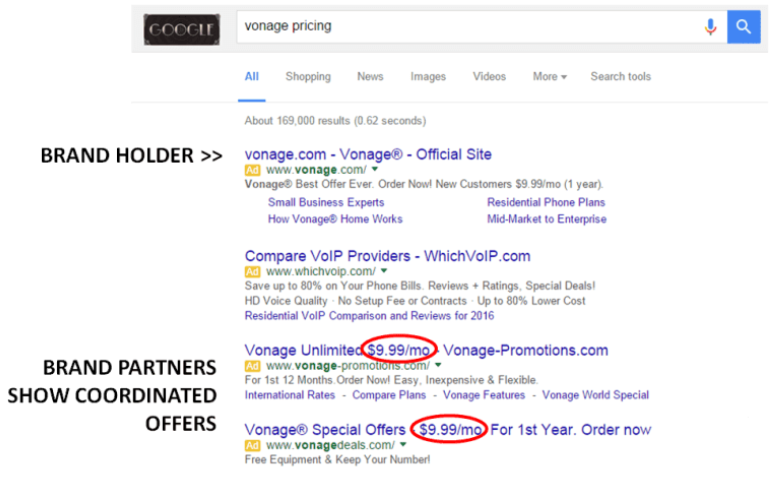Jump to section
Brand protection Lesson #5: Reducing competition
If you have a brand worth protecting, competitors are already bidding on your brand name. Some bid directly on your name, while others will bid on obvious derivatives, such as when Marketo bids on phrases like “Pardot drip marketing” (and vice versa). Many large brands have competitors bidding to every available ad position for every imaginable brand and brand-plus keyword.
The question is, what can you do to deal with competitors brazenly showing up on your hard-earned name? Your best options include:
- Complain. If the competitor is using your name in the ad copy, then file a complaint with the search engines. We will address this more later in the lesson, where we discuss the legalities of brand bidding.
- Own more real estate. You can take over more of the page real estate by working with partners.
- Be better than them. Being better means that you earn a top Quality Score, and the competitor does not. It means that you pay a reasonable CPC, while the competitors pay a lot! If the ROAS (return on ad spend) isn’t there, the competitor(s) will stop brand bidding because it isn’t worth it. Be the best “you” possible by using techniques such as remarketing, ad copy development, offer development, and landing page development.
Being the Best You
Your number one goal is to reduce competition. Here are a few do’s and don’ts to help you become your best self, which in turn will reduce the impact from competition:

- Do outsmart the minimum bid. Presuming you have optimized your ad copy and landing page — making you the most relevant brand bidder on your own brand — then ask yourself, does the minimum bid apply to you? It might not. Try ignoring the first-page minimum bid and instead bid a bit lower to learn where you rank. If you have success, your partners should follow suit. Don’t think you have to dramatically outspend your attackers.
- Don’t just display a generic ad. If the consumer found you through a brand-plus keyword, it’s likely that they want to buy something. I know it sounds obvious, but make sure to promote that “something” in your ad copy.
- Don’t ignore competitors.
- Competitors: Some savvy competitors might be attacking you in their ad copy, focusing on your product quality or pricing (e.g. “They rip you off, and we won’t!”). Study your competitors’ talking points closely, and use your own ad copy to address their attacks head- on. If they mention their lower prices, for example, be ready to emphasize your products’ other virtues.
- Resellers: If you are a manufacturer, make sure that only authorized resellers are brand bidding (if they are allowed). If you find an unauthorized reseller, take the necessary steps to stop their brand bidding, either through complaints to the search engine or by directly asking the reseller to stop.

- Do pay attention to your landing page. High-quality, relevant landing pages can differentiate you from competitors and keep costs down. Make sure your landing page highlights the keyword, and if you have an offer in the ad copy, repeat it on the landing page. This is Landing Page 101! Too often, I see inconsistent landing pages. Recently we searched “Macy’s cotton blankets” and saw a Macy’s ad in the number 1 position (smart!). When clicked, however, no cotton blankets appeared on the landing page — just a list of 64 blankets, unsorted and unfiltered (not smart!).
- Don’t let your partners have ugly landing pages. Your partner strategy will lose its effectiveness if the landing page experience is poor. To drive home this point, here’s a landing page we encountered a few days ago. It was promoted by a competitor when we conducted a brand search for “Vonage phone service.” The ad promoted a holiday special with a Christmas motif in March! (I am sure Vonage is glad this was not one of theirs.)

Hopefully this adds another eye-opener to the long list of, frankly, very basic strategies to reduce competition on your branded keywords. Many of these tips become obvious once you get weekly reports, with screenshots, showing how partners and competitors are advertising on your keywords. These reports can give you the ammo you need to quickly implement changes to copy, offers and landing pages. Knowledge is power in the world of brand bidding.
* * *
In Lesson 6, we’ll explain your enforcement options for competitors whose brand bidding tactics cross the line: filing complaints with search engines, establishing pacts/agreements, and lawsuits.
Share on Social
See Our Data at Work
Provide us with a competitor’s website, a set of keywords, or one of our 1,000+ verticals, and we’ll show you the power of our monitoring capabilities. Request a personalized demo today and see what our insights can do for you!
Trusted by







 Brand Protection
Brand Protection SEM Insights
SEM Insights Affiliate Compliance
Affiliate Compliance Ad Armor
Ad Armor Learning Center
Learning Center Guides & Webinars
Guides & Webinars We Love Data™
We Love Data™ About Us
About Us Our Data
Our Data Careers
Careers Our Team
Our Team News
News Contact Us
Contact Us
